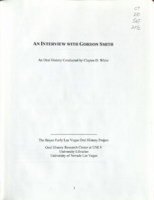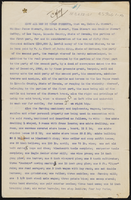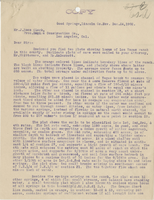Search the Special Collections and Archives Portal
Search Results

Transcript of interview with Isabella Jessie Curtis by Andrew B. Levy, February 15, 1979
Date
Archival Collection
Description
On February 15, 1979, Andrew Levy interviewed Isabella Jessie Curtis (born 1922 in Monroe, Wisconsin) about her experiences in Southern Nevada. Curtis first talks about her career in waitressing at several restaurants and casinos in Las Vegas before describing some of the early businesses in the Downtown Las Vegas area. The interview then moves to discussions on Curtis’s involvement in politics, her early recreational activities, and the atomic testing. The two later discuss the first telephones in Las Vegas, the Helldorado celebration, and her work at the Tropicana Las Vegas. The interview concludes with Curtis’s description on living in Sandy Valley, Nevada, and some of her first memories of the Union Pacific train depot in Las Vegas.
Text

Transcript of interview with Sara Denton by Claytee White, July 13, 2015
Date
Archival Collection
Description
Sara Denton loves life, laughter, and wonderful adventures. She is the mother of four children, a Distinguished Nevadan, lover of books and art, political campaign organizer, community activist, and friend. Sara is one of the founders of Boulder City’s most successful philanthropic fundraisers, Art in the Park. Denton was born in Paducah, Kentucky, into a family of readers and thinkers. Therefore, when the opportunity arose, at 18 years of age, to move the Washington, DC to work in the Signal Corps, she seized the opportunity. From the vantage point of her apartment, she could see the Secret Service assisting Franklin D. Roosevelt into his limousine at the back door of the White House. His polio was hidden from the public but this diversion allowed Sara and her friends to greet and be greeted by their hero. While in DC, Sara worked for General Hayes and one day struck up a conversation with a young soldier, Ralph Denton. Soon they married and moved to his home state, Nevada. After several years in Elko, NV, the Dentons moved to Las Vegas where Sara worked in the campaigns of Grant Sawyer, Howard Cannon, and Alan Bible. Moving the family to Boulder City though, was the wisest relocation by the family because the children grew up in a caring community with good schools. And the city provided the opportunity for Sara’s creativity to flow in many directions including travel, entrepreneurship, philanthropy, and community building efforts. This interview is filled with laughter. I enjoyed the conversation.
Text

Transcript of interview with John L. Houck by Perry L. Smith, March 14, 1981
Date
Archival Collection
Description
On March 14, 1981, collector Perry L. Smith interviewed police officer, John L. Houck, (born May 11th, 1944 in Butte, Montana) in his home in Las Vegas, Nevada. This interview offers an overview of the history of Las Vegas and insider details on early Las Vegas police work. The interview concludes with a discussion on Henderson and Boulder City.
Text

Theresa Thomas interview, March 13, 1995: transcript
Date
Archival Collection
Description
Thomas discusses her early life in Thistle, Utah before moving to Las Vegas, Nevada in approximately 1931, where her father worked on the Hoover Dam (Boulder Dam) construction. Thomas then talks about her early schooling in Boulder City, Nevada, her experiences as a swing and dance band musician, Block 16 in the Clark Las Vegas Townsite, and her memories of Las Vegas hotels and casinos. Other subjects Thomas covers include Las Vegas entertainers, entertainment venues, and women in the music industry during the 1930s.
Text

Transcript of interview with Lori Chenin-Frankl by Barbara Tabach, June 7, 2016
Date
Archival Collection
Description
Lori provides a wonderful narrative of her Judaism, her love of teaching children and her devotion to family and music. She talks about growing up in Las Vegas and becoming a bat mitzvah, a rarity for girls in 1973. Throughout her life, including the period where she moved around with her Air Force husband, she sought Jewish connections to help her feel at home no matter where she was.
Text

Transcript of interview with Gordon Smith by Claytee White, January 29, 2013
Date
Archival Collection
Description
Gordon Smith was born in Utah, but moved with his family to Babbitt, Nevada in 1947. His father, a barber, moved the family to Las Vegas in 1955. In this interview, Gordon recalls school and after-school pursuits; changes in the town; summer jobs; and college. He also talks about his military service and returning to Las Vegas to take up the razor himself - starting a successful barbering business of over 30 years.
Text
Thomas Hickey Political Papers
Identifier
Abstract
The Thomas Hickey Political Papers (1964-1996) contain the professional files of Hickey’s career as a Nevada State Assemblyman and Senator. Materials include constituent correspondence, voting records, memoranda, newspaper clippings, bills, and research documentation on topics such as the Yucca Mountain Nuclear Waste Repository, the Equal Rights Amendment (ERA), education, health, prisons, finance, and Nevada infrastructure. The collection highlights Hickey’s role on committees including finance, transportation, government affairs, and ways and means.
Archival Collection

Stewart family real estate documents
Date
Archival Collection
Description
Stewart family real estate documents
Text

Report surveying Las Vegas Ranch from J. T. McWilliams (Good Springs, Nevada) to J. Ross Clark (Los Angeles), December 24, 1902
Date
Archival Collection
Description
McWilliams' summary of his findings in his survey of the Las Vegas Ranch, including land boundaries and water resources. Link to one of the plats mentioned in the letter is in references field.
Text

Transcript of interview with Ronald Simone by Claytee White, May 5, 2009
Date
Archival Collection
Description
Musician Ronald Simone of Las Vegas credits his father’s guidance and his upbringing in New Haven, Connecticut, for shaping his musical and educational aspirations. Due to its proximity to New York City and the influence of Yale University, New Haven offered its residents the finest in musical entertainment; as a result, many musical greats were from or had lived in New Haven and most Broadway shows opened at New Haven’s Shubert Theater. Born in 1935 with the gift of perfect pitch, Simone began to play the piano at a young age and could play most pieces by ear. He began playing professionally at age eight in 1943 with a weekly stint on a radio show, Kitty's Revue. Still in grade school during World War II he began touring locally with an amateur producer, who formed a show that played military bases and hospitals around Connecticut and into New York and Massachusetts. In high school Simone formed his own trio and a quartet and played piano in gin mills, illegal card rooms, and resorts in upstate New York while playing trumpet in the high school band. He joined the Musicians Union at 18 and continued to play in New York and Connecticut clubs and theaters throughout his five years at Yale. During his second year at Yale the School of Music became a graduate school, from which Ron graduated in 1958. Ron’s sister Louise married one of his Yale classmates, a drummer, and the couple moved to Las Vegas. Ron visited his sister in 1959, loved the musical opportunities he saw, transferred his Musicians Union membership, and moved to Las Vegas with his friend, violinist Joe Mack, in September 1960. After sub work and playing a lounge show at the Riviera, he spent five and a half years in the Riviera showroom, moving in 1966 to the Desert Inn, where he played piano in the exclusive Monte Carlo Room for five years for the likes of Dean Martin, Sandy Koufax, Sammy Davis Jr., and Kirk Kerkorian. From there Simone went to the Dunes, where he remained for the next nineteen years working with choreographer Ronnie Lewis and rehearsing and playing all the Casino de Paris shows, line numbers, and production numbers. In July 1989, Musicians Local 369 went on strike. Because Simone was playing the Follies Bergere at the Tropicana—the first house band to strike—he was among the first musicians to walk out. Musicians at all but three Strip hotels (Circus Circus, Riviera, and the Stardust) followed. While the musicians strike lasted nearly eight months, Simone was recruited for sanctioned sub work for the duration at the Lido de Paris show at the Stardust. After the strike ended he worked with Johnny Haig's relief band playing six nights a week at various hotels.
Text
